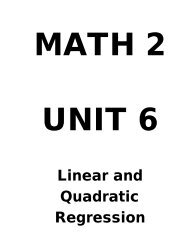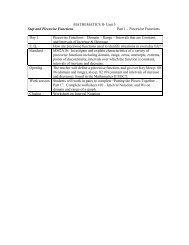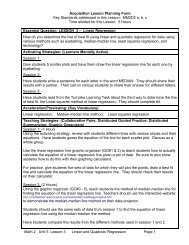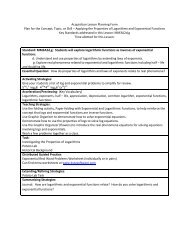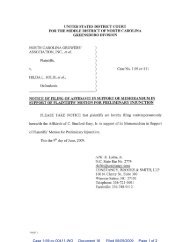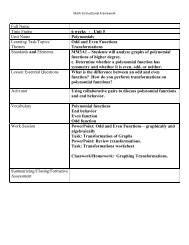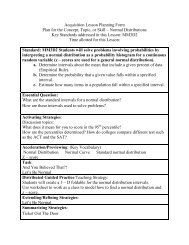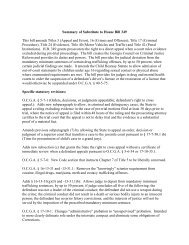State Action Plan Goals & Objectives - Ciclt.net
State Action Plan Goals & Objectives - Ciclt.net
State Action Plan Goals & Objectives - Ciclt.net
Create successful ePaper yourself
Turn your PDF publications into a flip-book with our unique Google optimized e-Paper software.
Office of Developmental Disabilities<br />
Division of Mental Health, Developmental Disabilities, and Addictive Diseases<br />
Georgia Department of Human Resources<br />
Agency/Program Information<br />
Mailing Address: 2 Peachtree Street NW, Suite 22-102 Street Address: 2 Peachtree Street NW, Suite 22-102<br />
City/<strong>State</strong>/Zip: Atlanta, GA 30303 City/<strong>State</strong>/Zip: Atlanta, GA 30303<br />
Web: http://mhddad.dhr.georgia.gov/portal/site/DHR-MHDDAD/<br />
To receive information on services or referrals please contact:<br />
Phone: (404) 463-8037<br />
Email:<br />
Agency/program description: The Office of Developmental Disabilities exists to support Georgians with developmental disabilities to live meaningful lives in their communities.<br />
The Office offers state-supported services that are aimed at helping families care for their loved one with developmental disabilities; serving people who do not live with their<br />
families in a home setting; and promoting independence and self-determination.<br />
Eligibility criteria: A person must have a diagnosis of mental retardation or a developmental disability and meet the criteria for "most in need." People who are "most in need" of<br />
services are those with social, emotional, developmental or physical disabilities resulting from mental retardation/developmental disabilities who without state-supported services<br />
would have significant difficulty or be unable to successfully live day to day. In addition, family support services are available for people with autism and certain other<br />
developmental disabilities.<br />
Eligible age groups: all ages<br />
Services offered: The services a person receives depends on a professional determination of level of need, as well as the availability of services and other community resources.<br />
Services may include: family support, supported employment, respite services, community residential services or personal support, day supports, and regional hospitals.<br />
Funding or financial assistance offered: Services are offered on a sliding scale, although services are free for people who meet Federal Poverty Level criteria. For people who<br />
are eligible for services under the DD waiver services the Mental Retardation Waiver pays for most community-based DD services.<br />
Services for People with Brain Injury (BI): Traumatic (TBI)* and Acquired (ABI)*<br />
People with brain injury eligible for services (note if there is a distinction between TBI and ABI): Yes, if the brain injury was sustained prior to age 22.<br />
Agency definition of brain injury (note if there is a distinction between TBI and ABI): "Traumatic brain injury" means a traumatic insult to the brain and its related parts<br />
resulting in organic damage thereto which may cause physical, intellectual, emotional, social, or vocational changes in a person. It shall also be recognized that a person having a<br />
traumatic brain injury may have organic damage or physical or social disorders, but for the purposes of this chapter, traumatic brain injury shall not be considered mental illness as<br />
defined in paragraph (11) of this Code section. (OCGA 37-3-1). There is no definition for ABI.<br />
Time period following injury that people referred to program: varies<br />
Source of referrals to program: anyone<br />
Specialized services for people with TBI or ABI: none<br />
Case management offered for people with TBI or ABI: case management is provided on a case-by-case basis<br />
Agency personnel receive training on TBI or ABI No<br />
Services for People with Spinal Cord Injury (SCI)<br />
People with SCI eligible for services: Yes, if they meet eligibility criteria.<br />
Agency definition of SCI: none<br />
Time period following injury that people referred to program: varies<br />
Source of referrals to program: anyone<br />
Specialized services for people with SCI: none<br />
Case management offered for people with SCI: case management is provided on a case-by-case basis<br />
Agency personnel receive training on SCI no<br />
Program Statistics<br />
Total number of people served from 7/1/05 - 6/30/06: 8,901<br />
Total number of people with brain injury: N/A<br />
Total number of people with SCI: N/A



